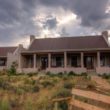
Cultural icon Coenie de Villiers once wrote a beautiful song, which accurately captures the charms of South Africa’s Karoo.
The song resonates very well with those who have been exposed to the Karoo, at some point in their lives. However, for those who possess limited knowledge about the Karoo, the song might not tug at the heart strings as much.
The same logic probably applies to the tourism potential of the region, which has not been fully exploited but indications are that is changing.
The Karoo is a central location, which is attached to four province – the Free States, Eastern Cape, Northern Cape and the Western Cape – and is serviced by five national roads.
So, to a large degree, it is quite impossible to avoid the Karoo if you are travelling from the country’s northern regions to the south and vice versa. However, not everybody uses those routes, and for a long time coastal options have often been more appealing for domestic tourists.
Purchasing property for tourist accommodation in the Karoo has often been associated with risk. Can a business really thrive in those areas?
Wayne Rubidge is the Area Principal for Pam Golding Properties in the Karoo and he believes there is strong evidence to suggest aspirant business people are more prepared to take that risk than ever before, adding that more South Africans are starting to see the value in starting businesses in the Karoo. People are seeing more investment opportunity in the Karoo.
Rubidge made particular reference to recent sales in the region, which include that of the prestigious Bergkant Lodge in Prince Albert, which fetched R11-million.
In addition, he identified what he felt were other great opportunities for investment in the town. They include a 4 star, seven- room complex with Karoo style cottage architecture which is priced at R9.3-million and a 2.4ha plot of land, for somebody seeking permanent relocation.
The farm in question includes an appealing four-bedroom main house, five self-catering guest cottages and two additional self-catering units for R6.87-million. Rubidge believes both will sell relatively quickly.
But why is it that people are starting to feel a little more secure about the Karoo? Why has the level of the interest increased? Rubidge attempts to explain.
“Many people are keen to explore the tranquil countryside in an escape from the stresses and bustle of busy city life and the Karoo has such variety to offer, with character-filled towns and different landscapes to suit every individual preference,” Rubidge told SABreaking News.
“Coupled with this, in the light of economic constraints domestic tourism has flourished, with cost-conscious South Africans eager to visit easily accessible destinations without even having to cross the borders or travel overseas. This has made the acquisition of a tourism or accommodation establishment very attractive to those wanting to relocate permanently to a country location,” added the Karoo area manager.
Then there is the small matter of isolation and connectivity. Important aspects to be addressed in the modern age and aspects that Rubidge feels the Karoo has addressed quite adequately.
“And, with the expansion of wireless ADSL service providers many towns now have faster internet connections which is increasingly important and of benefit to businesses or those working remotely,” he said.
So, how is it that people are becoming more acquainted with the Karoo?
“We find that many visitors either come to the Karoo having done their property searches via the internet and go to a specific town with the intention of buying a property as an investment or holiday house or alternatively, the growing trend is to seek a property in order to relocate to the country – and here the Karoo is an ongoing favourite.
“Alternatively, visitors travelling to the Karoo for a holiday or an event fall in love with an area or a town and decide to investigate property investment opportunities. Normally these buyers will not buy immediately but will start with an internet search and then visit the region again to inspect various properties. This process can take up to six months from the first visit and sometimes even longer or during the next holiday season.”
By Siya Mchunu